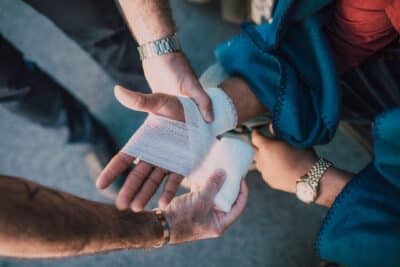Regardless of how careful you are in life, accidents resulting in personal injuries can and do happen. Suddenly, you’re left dealing with injuries, emotional trauma, property damage, and a slew of financial issues. On top of medical bills, you may also need to repair or replace damaged property—furthermore, your income can also be negatively affected.
When accidents cause personal injuries, claims against the at-fault party are common. This means navigating the stages of personal injury probes, which is rarely considered fun for anyone involved in the legal process.
If you’re unsure of the steps associated with personal injury probes, you are not alone. While your attorney will be familiar with the ins and outs, it’s also helpful when you know what to expect.
IMAGE: PEXELS
Steps To Navigating Personal Injury Probes
Before your case goes to court or you enter into settlement negotiations, you should take the following steps.
Undergo A Physical Examination
Claiming pain and suffering from an injury is common, but you also need to show proof. You should always put your health and safety first, and this means seeing a board-certified physician after the accident.
Don’t wait days, weeks, or months to make the appointment, which is the first step you should always take. Undergoing a physical examination is not only vital for your health, but it also gives you the documentation you need to prove you suffered injuries as a direct result of the accident.
Become An Amateur Detective
Okay, don’t go overboard on this step. Let the authorities handle investigating the accident scene. However, some accidents do not warrant a call to the police. There are also a few things you can do to help bolster your personal injury case. Take notes and photos of the accident scene and talk to any witnesses.
Don’t forget to get the witness’ contact information. Both your personal injury attorney and the involved insurance companies will also want to talk to anyone else present at the time of the accident. You also want to keep any documentation relating to your accident. In other words, don’t throw any receipts or bills away.
Report The Accident To The Authorities
Some accidents are serious enough to have the authorities respond immediately, which typically involves calling the police and emergency personnel. Even if you do not accept a ride to the hospital in an ambulance, it’s still a good idea to get checked out. You will still want to visit your physician for a thorough exam as soon as possible.
If the authorities are not called to the accident scene, you need to file an accident report within a day or so; this report will be necessary to substantiate your personal injury claim. Not only will the insurance adjuster want a copy of the report, but it may also be necessary if your personal injury case goes to trial.
Retain Legal Representation
Navigating a personal injury probe is challenging. Insurance companies are pushing you to accept low settlement amounts, and the thought of going to court is nerve-racking, especially if you do not have an attorney.
Your attorney will not only provide legal advice and represent your interests in court, but will also assess the merits of your case. From meeting filing deadlines to handling the negotiation stage and presenting your case to the court, your attorney will take care of everything so you can concentrate on recovering from the accident.
What Happens When Your Personal Injury Case Goes To Court
If you have turned down the settlement offered by the insurance company and cannot reach an agreement, the next step is filing your case with the courts. Don’t expect an immediate court date; it will take some time.
How long depends on the court’s calendar. Some courts are busier than others, so you may end up waiting a few months before you get an appearance date. What’s included in the filing documents?
This will vary depending on your unique case. However, all personal injury cases will file a Complaint. The Complaint document lists the involved parties, a description of the accident, and a list of the damages (both personal and property). A demand for financial relief is also included in the Complaint.
Be Prepared For Multiple Motions
Even with a set court date, there is still a lot going on behind the scenes. Attorneys for both parties may file motions of discovery, which is when both sides request documentation relating to the accident, your injuries, and any property damage.
This part of the pretrial motions is crucial since it lets both sides see the evidence for and against them before the trial starts. Hopefully, your case is strong enough to enter into the next pretrial phase.
Negotiations
Hopefully, the pretrial negotiations lead to an acceptable settlement offer, and the offer amount will depend on the particular strength of your case. Sometimes, the negotiations take place simultaneously with the discovery process.
Other times, negotiations only start after both sides review the evidence. Don’t feel pressure to accept a settlement offer, especially when you’re still undergoing medical treatment. You do not want to be stuck with medical bills after settling with the insurance provider.
Once you accept a settlement, you cannot file for additional damages. Some states encourage or even require both parties to discuss a settlement before heading to court. Your attorney will let you know if this applies to your case.
Be Ready For Post-Trial Motions
When a settlement agreement cannot be reached, your case will go to trial either before a jury or a judge. Even after winning your case and collecting the judgment based on your state’s laws, your personal injury case may still be open.
The defendant can contest the ruling and file an appeal with a higher court. If this happens, you will have to wait to receive your settlement/judgment award until the high court presents its ruling.
Navigating A Personal Injury Probe Is Easier With Help From An Attorney
Personal injury cases can be quite complex, and navigating the legal system in general can be daunting—let alone while you’re dealing with the various challenges that come with recovering from your wounds.
Thankfully, working with an attorney will help ensure your legal rights are protected. If you’re involved in an accident resulting in injuries and/or property damage, talk to an attorney to learn what steps you should take.
IMAGE: OPTICOUS
If you are interested in even more lifestyle-related articles and information from us here at Bit Rebels, then we have a lot to choose from.


COMMENTS